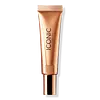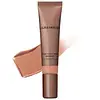What's inside
What's inside
 Key Ingredients
Key Ingredients

 Benefits
Benefits

 Concerns
Concerns

 Ingredients Side-by-side
Ingredients Side-by-side

Water
Skin ConditioningDimethicone
EmollientCetyl PEG/PPG-10/1 Dimethicone
EmulsifyingIsododecane
EmollientTalc
AbrasiveGlycerin
HumectantPhenoxyethanol
PreservativeSodium Chloride
MaskingMagnesium Sulfate
Sodium Dehydroacetate
PreservativeDisteardimonium Hectorite
StabilisingPotassium Sorbate
PreservativePolysilicone-11
Dimethiconol
EmollientBenzoic Acid
MaskingHydrogen Dimethicone
Propylene Carbonate
SolventDehydroacetic Acid
PreservativeAluminum Hydroxide
EmollientEthylhexylglycerin
Skin ConditioningMarrubium Vulgare Extract
Skin ConditioningCitric Acid
BufferingCI 77891
Cosmetic ColorantCI 77492
Cosmetic ColorantCI 77491
Cosmetic ColorantCI 77499
Cosmetic ColorantWater, Dimethicone, Cetyl PEG/PPG-10/1 Dimethicone, Isododecane, Talc, Glycerin, Phenoxyethanol, Sodium Chloride, Magnesium Sulfate, Sodium Dehydroacetate, Disteardimonium Hectorite, Potassium Sorbate, Polysilicone-11, Dimethiconol, Benzoic Acid, Hydrogen Dimethicone, Propylene Carbonate, Dehydroacetic Acid, Aluminum Hydroxide, Ethylhexylglycerin, Marrubium Vulgare Extract, Citric Acid, CI 77891, CI 77492, CI 77491, CI 77499
 Reviews
Reviews

Alternatives
Ingredients Explained
These ingredients are found in both products.
Ingredients higher up in an ingredient list are typically present in a larger amount.
Ci 77891 is a white pigment from Titanium dioxide. It is naturally found in minerals such as rutile and ilmenite.
It's main function is to add a white color to cosmetics. It can also be mixed with other colors to create different shades.
Ci 77891 is commonly found in sunscreens due to its ability to block UV rays.
Learn more about CI 77891Citric Acid is an alpha hydroxy acid (AHA) naturally found in citrus fruits like oranges, lemons, and limes.
Like other AHAs, citric acid can exfoliate skin by breaking down the bonds that hold dead skin cells together. This helps reveal smoother and brighter skin underneath.
However, this exfoliating effect only happens at high concentrations (20%) which can be hard to find in cosmetic products.
Due to this, citric acid is usually included in small amounts as a pH adjuster. This helps keep products slightly more acidic and compatible with skin's natural pH.
In skincare formulas, citric acid can:
While it can provide some skin benefits, research shows lactic acid and glycolic acid are generally more effective and less irritating exfoliants.
Most citric acid used in skincare today is made by fermenting sugars (usually from molasses). This synthetic version is identical to the natural citrus form but easier to stabilize and use in formulations.
Read more about some other popular AHA's here:
Learn more about Citric AcidPhenoxyethanol is a preservative that has germicide, antimicrobial, and aromatic properties. Studies show that phenoxyethanol can prevent microbial growth. By itself, it has a scent that is similar to that of a rose.
It's often used in formulations along with Caprylyl Glycol to preserve the shelf life of products.
Potassium Sorbate is a preservative used to prevent yeast and mold in products. It is commonly found in both cosmetic and food products.
This ingredient comes from potassium salt derived from sorbic acid. Sorbic acid is a natural antibiotic and effective against fungus.
Both potassium sorbate and sorbic acid can be found in baked goods, cheeses, dried meats, dried fruit, ice cream, pickles, wine, yogurt, and more.
You'll often find this ingredient used with other preservatives.
Learn more about Potassium Sorbate